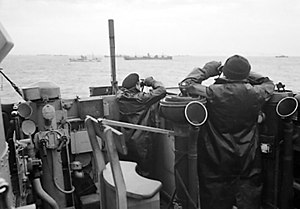 Global Information
Global InformationBattle of the Atlantic information
| Battle of the Atlantic | |||||||
|---|---|---|---|---|---|---|---|
| Part of the Second World War | |||||||
 Officers on the bridge of an escorting British destroyer stand watch for enemy submarines, October 1941 | |||||||
| |||||||
| Belligerents | |||||||
|
| ||||||
| Commanders and leaders | |||||||
|
| ||||||
| Casualties and losses | |||||||
|
| ||||||
The Battle of the Atlantic, the longest continuous military campaign[11][12] in World War II, ran from 1939 to the defeat of Nazi Germany in 1945, covering a major part of the naval history of World War II. At its core was the Allied naval blockade of Germany, announced the day after the declaration of war, and Germany's subsequent counter-blockade. The campaign peaked from mid-1940 through to the end of 1943.
The Battle of the Atlantic pitted U-boats and other warships of the German Kriegsmarine (Navy) and aircraft of the Luftwaffe (Air Force) against the Royal Navy, Royal Canadian Navy, United States Navy, and Allied merchant shipping. Convoys, coming mainly from North America and predominantly going to the United Kingdom and the Soviet Union, were protected for the most part by the British and Canadian navies and air forces. These forces were aided by ships and aircraft of the United States beginning September 13, 1941.[13] The Germans were joined by submarines of the Italian Regia Marina (Royal Navy) after Germany's Axis ally Italy entered the war on June 10, 1940.
As an island country, the United Kingdom was highly dependent on imported goods. Britain required more than a million tons of imported material per week in order to survive and fight. In essence, the Battle of the Atlantic involved a tonnage war; the Allied struggle to supply Britain, and the Axis attempt to stem the flow of merchant shipping that enabled Britain to keep fighting. Rationing in the United Kingdom was also used with the aim of reducing demand, by reducing wastage and increasing domestic production and equality of distribution. From 1942 onward, the Axis also sought to prevent the build-up of Allied supplies and equipment in the UK in preparation for the invasion of occupied Europe. The defeat of the U-boat threat was a prerequisite for pushing back the Axis in Western Europe. The outcome of the battle was a strategic victory for the Allies—the German tonnage war failed—but at great cost: 3,500 merchant ships and 175 warships were sunk in the Atlantic for the loss of 783 U-boats and 47 German surface warships, including 4 battleships (Bismarck, Scharnhorst, Gneisenau, and Tirpitz), 9 cruisers, 7 raiders, and 27 destroyers. This front ended up being highly significant for the German war effort: Germany spent more money on producing naval vessels than it did every type of ground vehicle combined, including tanks.[14]
The Battle of the Atlantic has been called the "longest, largest, and most complex" naval battle in history.[15] The campaign started immediately after the European war began, during the so-called "Phoney War", and lasted more than five years, until the German surrender in May 1945. It involved thousands of ships in a theatre covering millions of square miles of ocean. The situation changed constantly, with one side or the other gaining advantage, as participating countries surrendered, joined and even changed sides in the war, and as new weapons, tactics, counter-measures and equipment were developed by both sides. The Allies gradually gained the upper hand, overcoming German surface-raiders by the end of 1942 and defeating the U-boats by mid-1943, though losses due to U-boats continued until the war's end. British Prime Minister Winston Churchill later wrote "The only thing that really frightened me during the war was the U-boat peril. I was even more anxious about this battle than I had been about the glorious air fight called the 'Battle of Britain'."[16]
Cite error: There are <ref group=lower-alpha> tags or {{efn}} templates on this page, but the references will not show without a {{reflist|group=lower-alpha}} template or {{notelist}} template (see the help page).
- ^ Cosmos Philly.
- ^ NZ govt.
- ^ Collins 1964, p. 248.
- ^ a b White 2008, p. 2.
- ^ a b Bennett 2007, p. 301.
- ^ Bowyer 1979, p. 158.
- ^ Bennett 2007, p. 302.
- ^ "British Losses & Losses Inflicted on Axis Navies". National Museum of the Royal Navy. Retrieved 24 February 2018.
- ^ Giorgerini 2002, p. 424.
- ^ Blair 1996a, p. xiii.
- ^ Woodman 2004, p. 1.
- ^ Carney, Robert B., Admiral, USN. "Comment and Discussion" United States Naval Institute Proceedings January 1976, p. 74
- ^ United States Strategic Bombing Survey Vol 3, Effects of Strategic Bombing on the German War Economy, 1945, p. 144.
- ^ Syrett 1994, p. ix.
- ^ Edgerton 2011, p. 158.